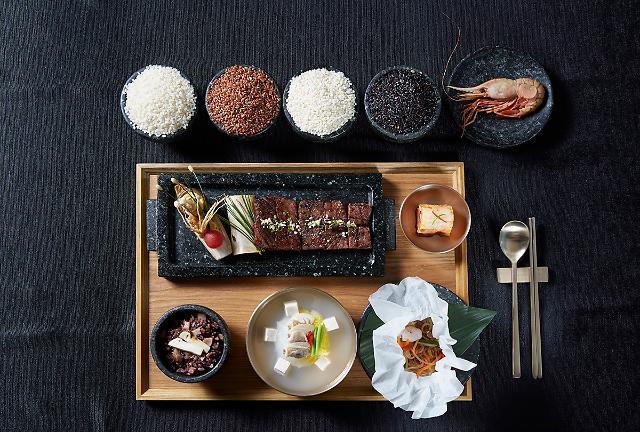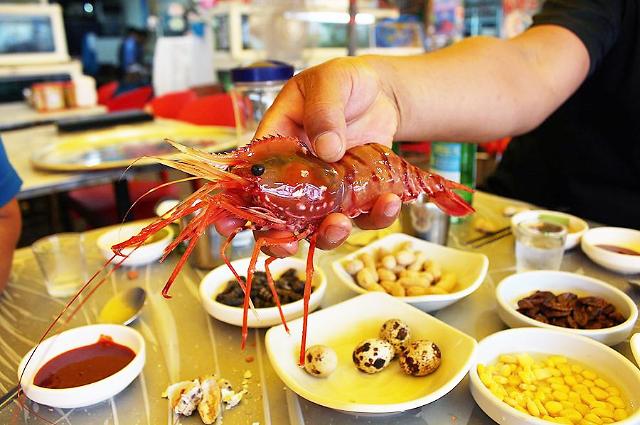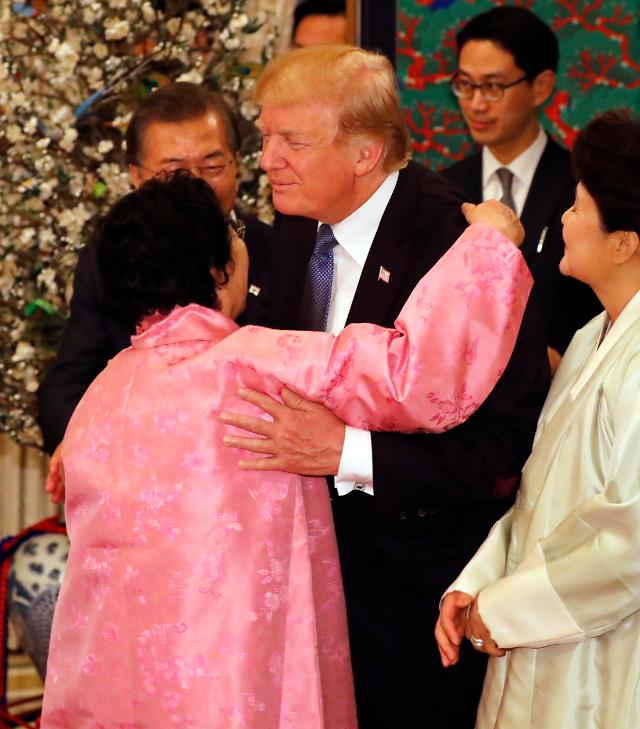
A presidential picture shows 'Dokdo Shrimp' (top right) served at a state banquet on November 7 for U.S. President Donald Trump. [Courtesy of the presidential Blue House]
A rare species of shrimp served at a state banquet for U.S. President Donald Trump and the invitation of an old woman sexually enslaved by Japan's imperial army irked Tokyo, fanning a prolonged diplomatic row that has hampered an American campaign to bolster a trilateral alliance in Northeast Asia.
The popularity of "Dokdo Shrimp" surged after it was served at Tuesday's state dinner at the office of President Moon Jae-in. Prices soared due to strong demand among South Korean consumers but dealers reported sellout.
The shrimp, wearing beautiful horned red armor adorned with crimson stripes, is famous for being a gourmet's seasonal favorite despite its price standing at about 150,000 won (134 US dollars) per kilogram.

A restaurant client shows a Dokdo shrimp favored by gourmets as a seasonal delicacy. [Online community 'Instiz']
The shrimp has a symbolic meaning as it is only caught in the deep waters around Dokdo, a chain of islets located in the middle of waters between the Korean peninsula and Japan. The South Korea-controlled islets, known as Takeshima in Japan, has been the source of diplomatic wrangling.
Japan took the menu and the appearance of a former comfort woman at Moon's banquet as a provocation and lodged a protest through diplomatic channels. "There is a need to avoid making moves that could negatively affect" cooperation between Tokyo, Washington and Seoul, Japan's top government spokesman Yoshihide Suga told reporters.
Seoul blasted Tokyo for taking issue with South Korea's state event. "As the menu for a state banquet and invited guests were decided by taking various factors into consideration, it is not appropriate to raise questions about this," Foreign Ministry spokesman Noh Kyu-duk told reporters. "Our government has conveyed this position to Japan through diplomatic channels."

U.S. President Donald Trump embraces Lee Yong-soo, an 88-year-old former "comfort woman" at a state banquet at South Korea's presidential Blue House on November 7. [Yonhap Photo]
During his 12-day Asia trip, Trump has revealed an attempt to boost a trilateral alliance involving the United States, South Korea and Japan, in response to China's increasing influence in Northeast Asia. However, the shrimp has created an unexpected obstacle.
For decades, Seoul and Tokyo have been locked in a lingering row over Dokdo, comfort women, school textbooks and other emotional issues related to Japan's 1910-45 colonial rule over the Korean peninsula.
Lee Yong-soo, an 88-year-old victim of Japan's wartime sex slavery, was greeted and embraced by Trump, and his action, intentional or not, drew warm praise from South Koreans. She later said her presence in the banquet is "none of their business". "They are too arrogant," she added.
Historians estimate that up to 200,000 women were forced to work in front-line brothels for Japanese troops. Many South Koreans want Tokyo's sincere apology.
Under a 2015 deal, Japan agreed to donate one billion yen ($8.7 million) to a foundation dedicated to supporting comfort women. In return, Tokyo urged Seoul to tear down the "comfort woman" statues erected by civic groups. Moon has called for a review of the deal, insisting many Koreans do not endorse it.
Copyright ⓒ Aju Press All rights reserved.


View more comments